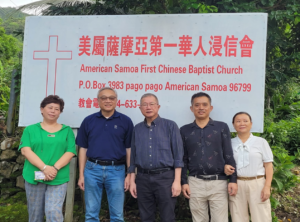Objective Markers for the Call to the Vocational Ministry
Our God is a God who calls – calling people to Himself to become part of His Body, the church; calling all of His people to serve Him in His church; and calling them to serve Him vocationally.
Serving God vocationally is also known as the “Full Time Ministry” which implies that a believer believes that God has called him or her to devote his entire life and career in serving Him. This is a decision that should not be taken lightly by the believer or the church. It is a “God-moment” for the believer as well as for the church.
All ministers serve God vocationally on the basis of a call from God. Frequently, the one feeling being called comes into the decision-making process with a lot of emotions as he or she responds to God’s call on his or her life. The call, in the most part, do not usually come with an audible voice that you hear with your physical ears but deep down in your heart. Therefore, clarifying the call is important and the first big step in the journey for the formation of a minister.
The church rejoices by the fact that God has called His workers into His harvest field in response to the prayers of His children. Therefore, it is not uncommon for the church to feel “intimidated” in that the church could only respond to such a subjective decision in the affirmative, thinking, “God has answered our prayers and who are we to question the work of God in a person’s life?” However, I believe that it is the responsibility of the church, the Body of Christ, to help the person to clarify His calling because it is a life and a life-style changing moment that has serious consequences not only for the individual and his or her family but the church and the kingdom work as well. In light of these considerations, there are certain objective markers that would help the individual and the church to determine whether a person is called of God. The following markers are for the individual feel called and for the church:
1. Are you a growing and a maturing believer? It is in the process of growing and maturing as a believer that you have developed a desire to seek after God’s will for your life and to honor and please Him in all that you do. For the church, it has the responsibility to help the one feel called to the ministry to evaluate if he or she is a growing and maturing believer and whose character exhibits the Fruit of the Spirit (Galatians 5:22-23) growing in Christ-likeness and one who aspires to fulfill the qualifications of spiritual leadership as taught in I Timothy 3:1-7. This is because ministers get into trouble in ministry is not because of a lack of knowledge but a lack of integrity. The question the church needs to ask is: Does the church have enough time and opportunity to make a judgment that the person is growing in maturity and exhibits integrity in ministry. Immaturity at a certain point in time or past mistakes do not necessarily disqualify a person for ministry. The question to be asked is whether the person is growing and maturing in the sense of his or her understanding his or her personhood as a minister. It might not be a bad idea that the church invests time and money in having the person undergo a battery of tests that would also gauge in some measure, the emotional stability of the person.
2. Are you actively involved in ministry whether in your own church or in a Christian organization? Your life as a minister of the Gospel is to serve the God who has called you into ministry. If you are not already actively serving Him faithfully, you might want to talk to your pastor or leaders in the church how you might begin serving using the giftedness that God has given you. If you feel called to be a missionary, have you sought out opportunities to serve and to minister to your intended people group or any migrant group living in your community? This is because missionary service is always to a people, not to a place! For the church, it has the responsibility to provide the opportunities for the person to be involved in ministry based on interest, giftedness and faith-walk of the person. In the matter of faith-walk, it should provide opportunities that stretches the faith of the person ministering outside his or her comfort zone. The question the church should ask itself is: How well does the person function outside his or her comfort zone?
3. When serving, do you feel that if you could devote more time and effort into the ministry, you could do more for and with the Lord? As you serve the Lord, there comes a time when you become so involved in the ministry that you experience the joy of serving. As you serve, you begin to realize that there are so many needs out there and if you have the time, you could do more. For the church, it has the responsibility to keep encouraging the one who feels called of the Lord to keep seeking the Lord through the exercise of the spiritual disciplines and to grow in his or her understanding God’s will for his or her life. The question the church should be asking is: How is the person growing in his or her personal walk with Christ and maintains a good balance between family, secular work and ministry?
4. Are there those around you that affirm your “call” to the ministry? God has given you the church that can affirm your call to the ministry as they watch you serve and as they serve with you. It would be wise of you to share about your calling with your pastor and leaders in the church and seek their counsel, advice and affirmation. In the event they do not affirm you, continue to seek the Lord if you feel strongly enough about your call and continue to seek their wise counsel and godly advice. For the church, it has the responsibility to provide wise counsel and to speak the truth in love when the person is found to be not called to the vocational ministry. Ultimately, the question that the church needs to ask and respond to is: Everything being equal, would your church be willing to consider the brother or sister at the end of his or her training, calling him or her to be on staff at the church?
Being called of God is an honor and a privilege as you consider that the Creator God has chosen you to be His unworthy servant. Therefore the calling calls for a response with a deep sense of humility on your part. With the honor and privilege also comes a tremendous responsibility to be prepared for ministry. However, there are some personal issues that need to be addressed first as you prepare to be equipped for ministry.
It is to these that we now turn – Personal Preparation for Ministry.
客觀的引證
我們的神是一位呼召的神。衪呼召人們跟隨祂成為基督身體的一部份。主的身體就是教會; 祂也呼召所屬衪的人在教會裡服侍祂; 衪更個別呼召一些信徒來終生事奉衪。這也被稱為「全時間事奉」或「全職事奉」-意思是,神呼召他/她將整個的人生,包括職業完全擺上事奉衪。 這樣的呼召,對該信徒或教會而言,都是一件非常嚴肅的事情, 是「神聖」的時刻。
所有全職事奉神的傳道人都是建基於神的呼召。很多時候,受感召的人面對神在他/她生命中這樣的呼召,在回應和決定的過程中,會經歷許多情緒及感觸。大多數情況下,神的呼召並不是從肉身的耳朵中聽到某些聲音,而是在他/她內心深處的感覺。 因此,要澄清這是否來自神的呼召是非常重要,也是成為傳道人過程的第一大步。
當有這樣受感動的人出現時,教會會感到高興,認為神回應祂兒女們的禱告,呼召祂的工人收祂的莊稼。在某一些的情況是對的。因此,面對感召者這樣主觀的領受,教會很多時都不會提出相反的意見,只以肯定的方式回應,心想:「神已答允了我們的祈禱,我們是誰竟去質疑神在他/她個人身上的作為?」。然而,教會作為基督的身體,是有責任幫助這個人澄清這到底是神的呼召與否。因為這個決定影響重大,不單只是個人生命方向或生活方式的改變,還有他/她的家庭,更直接影響教會和神國的事工。有鑑於此,一些客觀的標記或印証可以幫助他/她和教會去確定這感召是否出於神。 以下標記或印証是應對個人和教會而言:
1.你是一個成長中和成熟中的信徒嗎? 作為信徒,在不斷成長和成熟的過程中,會渴慕尋求神在自己生命中的旨意,並願意在一切所行的事上榮耀神討衪的喜悅。對教會而言,教會有責任去評估那感覺被呼召的人,是不是一個不斷成長和成熟中的信徒,他/她的品格有否結出聖靈的果子(加拉太書5:22-23),行事為人有否活出基督的樣式。並且,有否追求達到提摩太前書3:1-7在屬靈領袖方面所要求的資格。因為,傳道人在事奉中遇到最大的問題不是缺乏知識,而是缺乏個人的誠信和操守。教會需要留意的情況,就是教會是否有足夠的時間與這人接觸和相交,以至能確認他/她是否不斷在成長和成熟,並在事工中表現出個人的誠信和操守。 或許他/她在過去某個時期有不成熟或錯誤,但不應該完全否定他/她的資格成為一位傳道人。要問一問,他/她對自己個人的「我」理解多少? 教會或許可以投資時間和金錢讓他/她接受一系列的測試,在某程度上,這也衡量出個人情緒的穩定性。
2.你是否積極參與事奉,無論你在自己的教會,或在其他基督教機構? 神呼召你一生成為衪的僕人事奉衪。 如果你在教會還沒有積極參與事奉,你需要跟你的牧者或教會領袖傾談,讓你有機會運用神賜予你的恩賜忠心地服侍。若你感覺神呼召你成為宣教士,你有否尋找機會接觸及服侍在當地居住的異鄉群體? 對教會而言,教會有責任基於每個人的靈程、恩賜和興趣,提供參與事奉的機會。 在信心靈程的學習上,提供信心增長的機會,讓他/她在舒適安穩的環境以外服侍。 教會應該留意:他/她在舒適安穩的環境以外服侍之表現?
3. 事奉中,你是否覺得,如果你有更多的時間和精力,你會與主同工,為衪做更多的事嗎? 當你越事奉主,越投身參與事奉,你會經歷到事奉中的喜樂。 當你服侍時,你會發現到處有很多需要。如果你有時間,你一定會為主做更多。 對教會而言,教會有責任不斷鼓勵那些感覺到主呼召的人,藉著個人屬靈的操練與主親密交通,尋求神在他/她身上的旨意。 教會應該問一問:這個人如何在與神同行中成長,並在家庭、世俗事情和事工之間是否保持良好的平衡?
4.你身邊的人,有沒有確認你心中的感召,成為一位傳道人? 神已賜給你教會,他們看見你的服侍,也與你同工。你應該與你的牧者和教會領袖分享你心中的感召,尋求他們的忠告、建議和肯定,這是明智的。他們可以確認神對你的呼召。如果他們不確認,那你就要繼續尋求主及與教會領袖們繼續溝通,尋求他們的勸告和建議。對教會而言,當教會認為他/她並未被神呼召作全時間事奉,教會便要用愛心說誠實話,並有責任提供的勸告。最終,教會需要回答的問題是:說句公道話,當這位弟兄/姊妹受訓裝備完畢後,教會是否願意考慮他/她成為教會的同工?
被神呼召成為全時間事奉是一個榮譽,也是神賜予的一個特權。因為,造物主揀選了不配的你,成為衪的僕人。面對神的呼召,你要以極謙卑的態度作出回應。隨著特權,同時也帶來了巨大的責任去預備自己,接受裝備。但在這一切之前,有一些個人的問題必須首先得到解決或處理。
這就是我們接著要說的 – 個人的準備。






